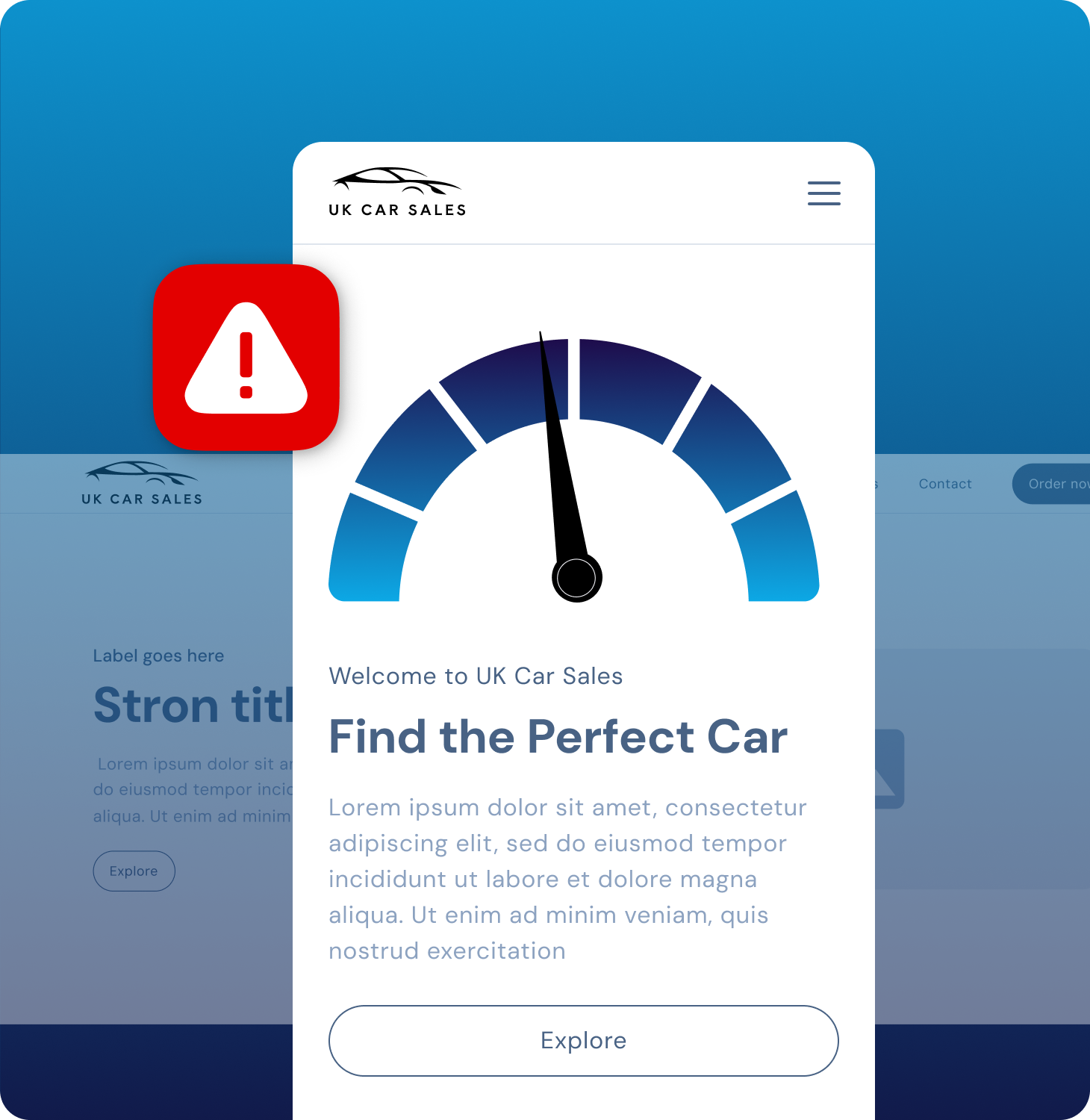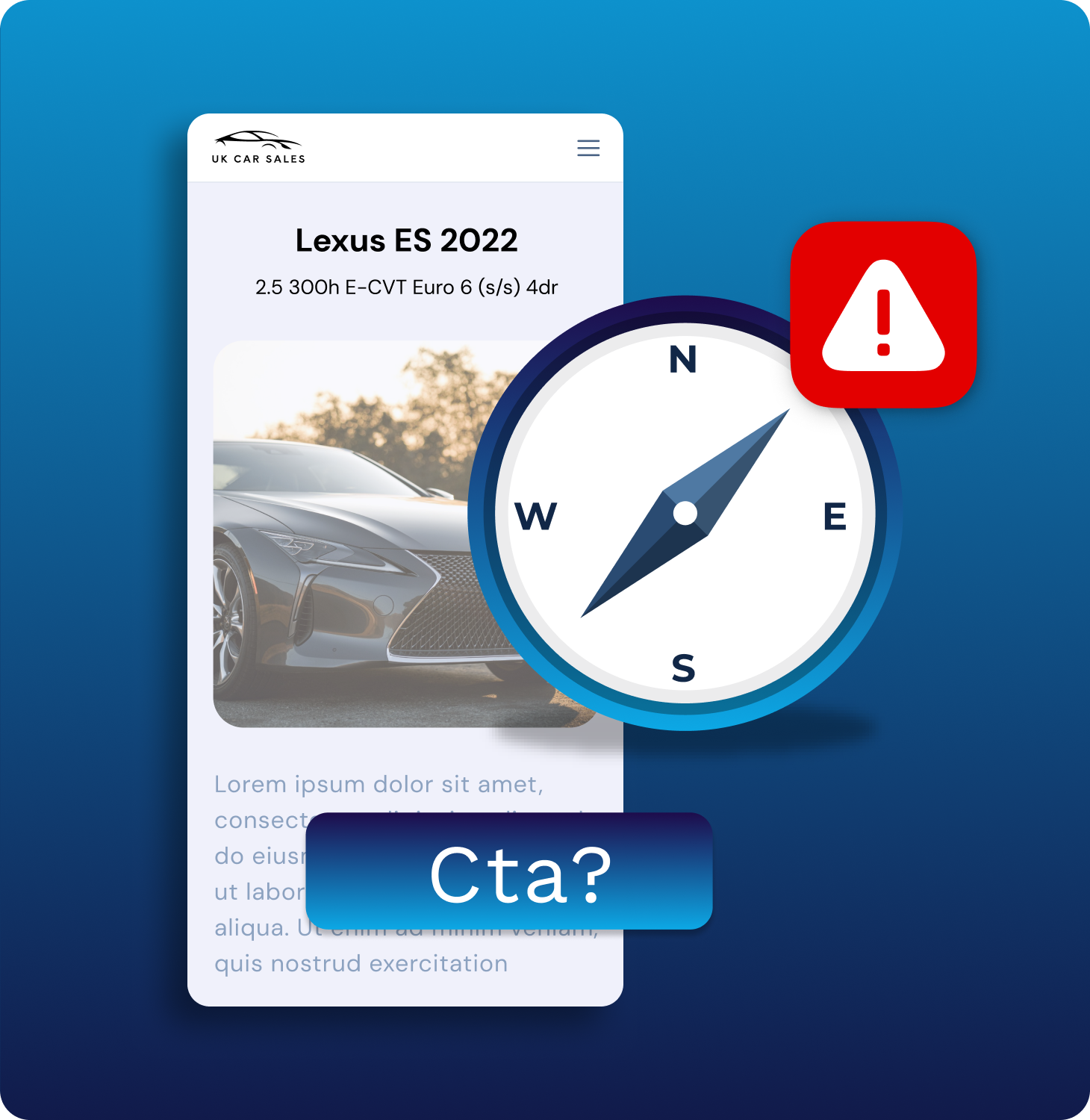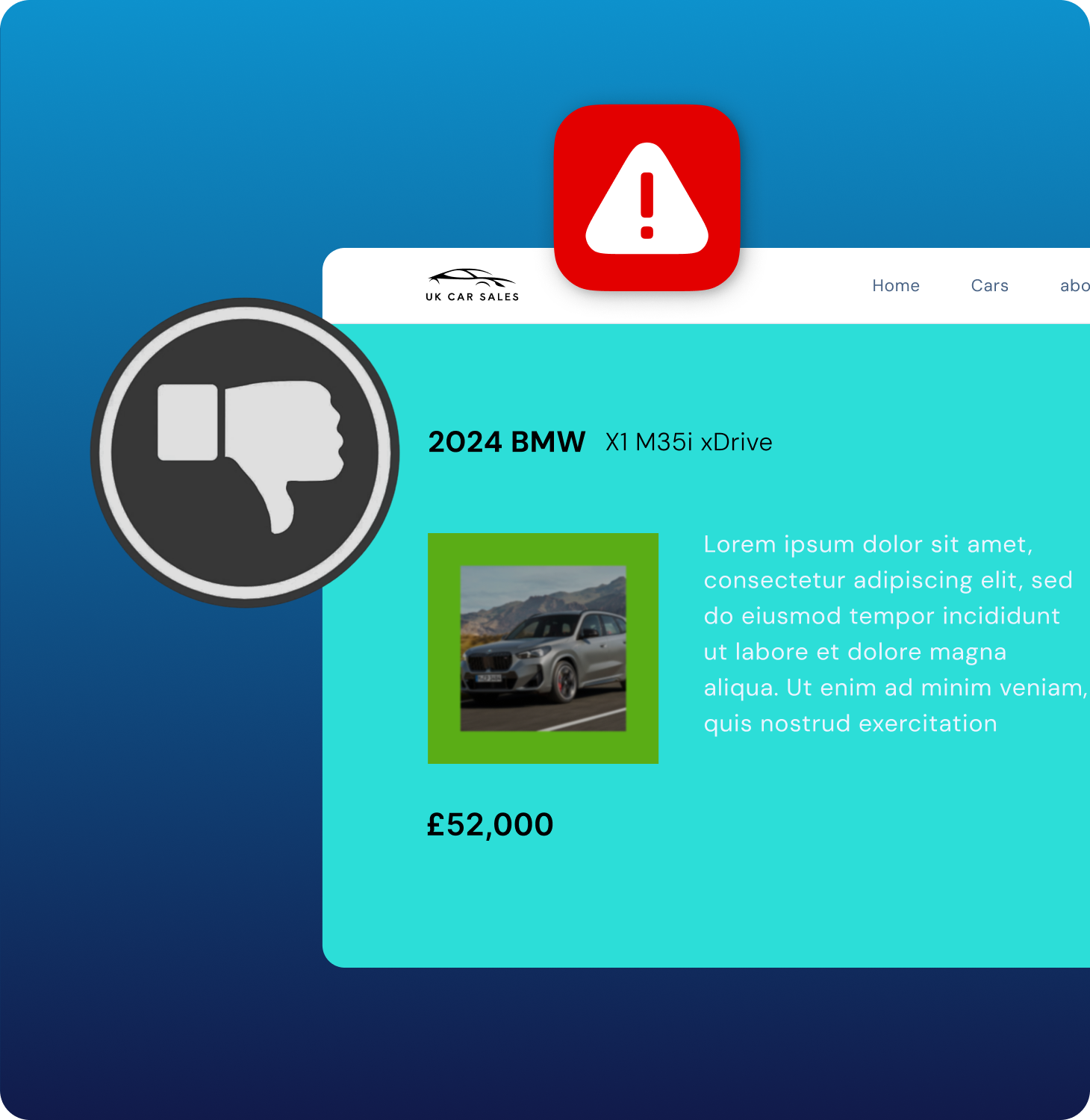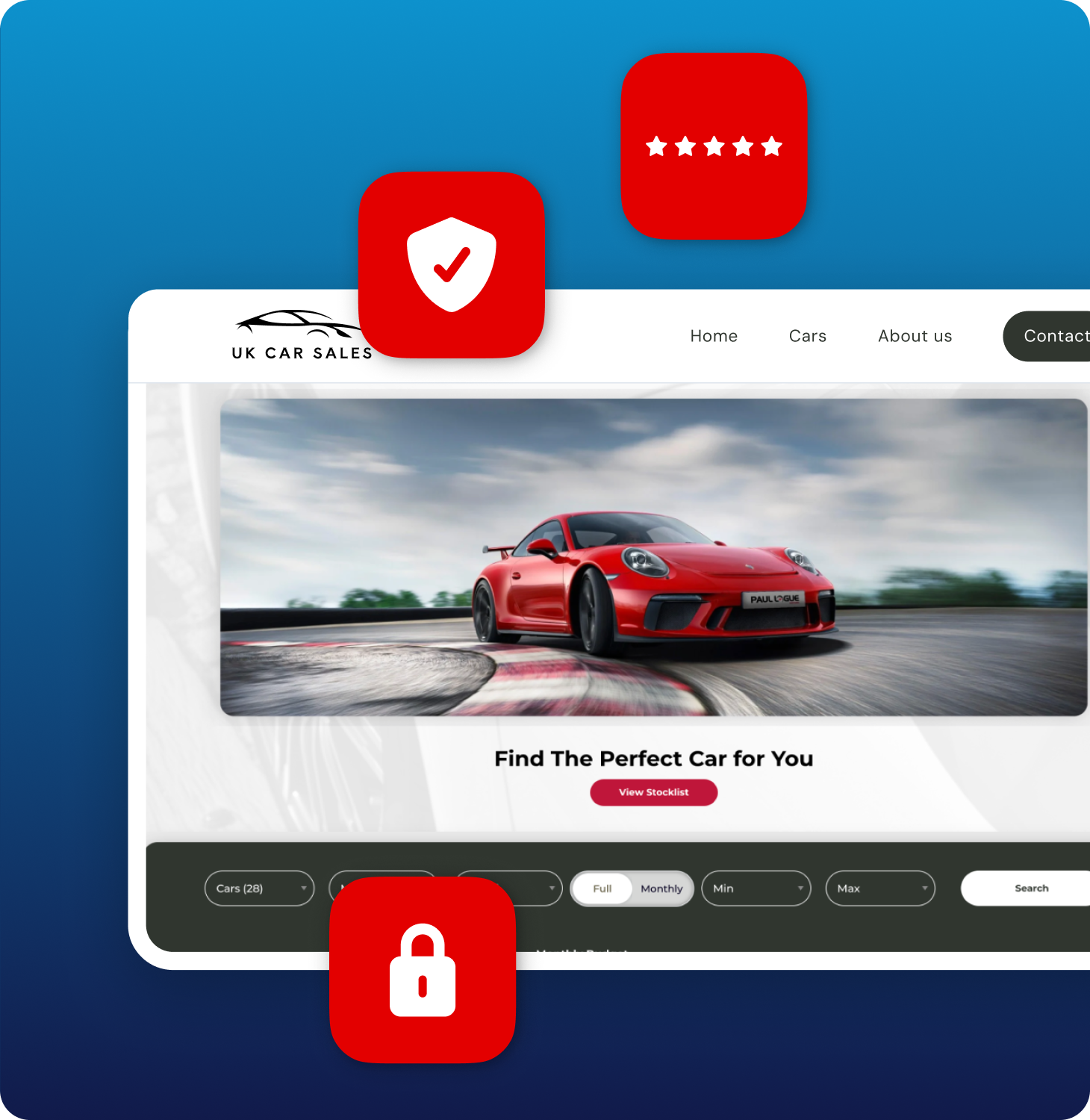Your dealership’s website is more than an online brochure. It’s your digital forecourt, often the first interaction potential customers have with your brand. Yet, many car dealers lose valuable leads every day because of small but costly website mistakes.
Slow load times, confusing navigation, outdated listings, and poor SEO can all drive customers away before they ever contact you. The good news? Every one of these issues can be fixed.
In this guide, we’ll walk through nine of the most common dealership website mistakes, explain why they matter, and show you how to fix them. You’ll also see how Spidersnet’s website, dealer management system, and marketing services help dealers create fast, reliable, and lead-generating websites that perform as well as they look.
1. Poor Website Performance and Mobile Experience
Your customers expect speed. If your website takes more than three seconds to load on mobile, you could be losing over half your visitors before they even see your stock. In an industry where buyers make quick comparisons between dealers, a slow or clunky site is enough to send them to a competitor.
To fix this, start by auditing your load times using tools like Google PageSpeed Insights. Aim for a load time under three seconds on mobile. Use a responsive, mobile-first design with easy-to-tap buttons, accessible forms, and clear navigation. Compress your images, use lazy loading, and avoid heavy scripts that slow things down.
At Spidersnet, our websites include built-in mobile optimisation and speed tuning, ensuring your virtual showroom runs like a top-performing salesperson 24/7.

2. Confusing Navigation and Poor Site Structure
Visitors come to your site with clear goals; browsing stock, checking finance options, or booking a test drive. If it takes too many clicks to reach these actions, they’ll leave.
Simplify your navigation by limiting your main menu to five to seven clear categories, such as New Cars, Used Cars, Finance, About Us, and Contact. Use customer-focused labels such as “Browse Stock” will work better than “Vehicle Listings”, and ensure search and filter options are easy to access from any page.
Each vehicle detail page should include clear calls-to-action and an easy path back to the search results.
With Spidersnet’s websites, we design navigation that follows the buyer journey, helping visitors find what they need quickly and encouraging them to take action.

3. Weak or Missing Calls-to-Action (CTAs)
Even with a great stock selection and competitive offers, unclear CTAs (calls to action) can stop conversions cold. Many dealer sites rely on vague buttons like “Learn More” or “Submit,” which do little to guide users toward the next step.
Using strong, action-oriented CTAs such as “Book a Test Drive”, “Check Availability” or “Get a Valuation” will help drive users in the right direction. Make them stand out visually with contrasting colours and place them prominently on all relevant pages. Offer multiple conversion paths such as forms, chat, and click-to-call buttons so users can choose what’s convenient for them.
At Spidersnet we help optimise CTAs, ensure ideal placement and design through our vast experience, and fine-tune conversion funnels during your website build so more of your visitors become qualified leads.
4. Outdated or Inaccurate Stock Listings
Few things damage trust faster than showing vehicles that are already sold or mispriced. Buyers who fall in love with a car online only to find it’s unavailable are unlikely to return.
Your listings should always reflect real-time availability. By integrating your Dealer Management System (DMS) your website will automatically update stock and pricing as changes happen. You should be able to easily mark sold vehicles promptly or mark them as reserved.
Each listing should include detailed specifications, mileage, and a full set of high-quality images.
Spidersnet’s Dealer Management System allows seamless stock synchronisation, ensuring your listings are accurate, current, and trustworthy.
5. Poor Vehicle Presentation and Weak Visuals
Your photos and descriptions are the digital equivalent of your showroom display. Low-quality images or “Coming Soon” placeholders make a poor first impression and can instantly reduce buyer interest.
Invest in professional photography that shows your vehicles in the best possible light. Ensure you include as many shots as possible, such as interior, exterior, engine, and detail shots. Don’t publish a listing until it’s complete with full details and photos.
It’s important to optimise image file sizes to maintain quality without affecting speed, and use consistent lighting and branding across all listings.

6. Technical SEO and Content Mistakes
Even a beautifully designed site won’t deliver results if search engines can’t find it. Missing title tags, duplicate text, broken links, and poor metadata all harm your visibility in search results.
By making sure every page has a unique title tag and meta description, including relevant keywords and your location, you can help your site to appear in search results more often. Avoid copying manufacturer text, write unique content that reflects your dealership’s expertise and local focus. Keep your internal links tidy, fix broken URLs, and use XML sitemaps to help Google index your pages effectively.
Our dealer websites do the hard work for you when it comes to the above. You could even go a step further with specialist car dealer SEO services, which include full SEO audits, ongoing optimisation, and content guidance to ensure your website ranks well and converts traffic into enquiries.

7. Weak Trust Signals and Conversion Barriers
Buying a car is a big decision, and customers need to feel confident in your dealership. If your contact details are hidden, forms are long, or reviews are missing, trust can quickly break down.
Display your contact number and address clearly on every page. Embed a Google Map with your dealership location and opening hours. Highlight reviews, awards, and finance partner logos to build credibility.
Keep enquiry forms short and mobile-friendly, and use live chat or fast-response tools to capture leads in real time.
At Spidersnet, our websites are built around conversion and trust, with features like review integration, click-to-call buttons, and responsive contact forms that make it easy for customers to reach you.
8. Ignoring Local SEO and Website Maintenance
Most car buyers start their search with phrases like “used cars in [city]” or “dealership near me.” If your site isn’t optimised for local intent, you’ll struggle to reach nearby buyers.
Make sure your Google Business Profile is claimed and fully optimised with accurate contact details, business categories, photos, and recent reviews. Include location-based keywords in your page titles and meta descriptions, such as “Used Cars in London” or “Car Dealer in Brighton.”
Keep your site active with regular updates, blog posts, and new content about your dealership, local market trends, or special offers. Fresh content signals that your business is active and trustworthy.
Spidersnet websites are built with local SEO in mind, meaning your website with us will already be optimised for your local terms based on your location. Our team will help you get your Google Business Profile set up if you don’t already have one and provide advice on how to make the most of your listing.
9. Overdependence on Third-Party Platforms
Third-party listing sites and aggregators can drive useful traffic, but relying on them too heavily weakens your brand and reduces long-term control. Your website should be your digital hub, not just a reflection of other platforms.
Integrate your DMS, CRM, and stock feeds so your website remains your central, up-to-date source of truth. Use your site to collect leads directly, build your email database, and promote exclusive offers.
Spidersnet’s Dealer Management System supports complete integration across your sales and marketing systems, giving you full ownership of your digital presence.
Why Fixing These Mistakes Matters
A well-built dealership website isn’t just about design, it’s about performance. Every improvement in speed, usability, and trust directly increases leads, showroom visits, and sales. A fast, intuitive site keeps users engaged, while a consistent brand experience builds credibility.
Fixing these mistakes transforms your website into a lead-generation engine. You’ll convert more visitors without spending more on advertising, and your site will start working as hard as your sales team.
How Spidersnet Can Help
At Spidersnet, we provide everything a dealership needs to succeed online:
- Website design and optimisation: Fast, mobile-first, and built for conversion.
- Dealer Management System integration: Real-time stock and pricing updates.
- Marketing, SEO, and support: Local SEO, content, analytics, and lead generation.
Your website should be your hardest-working salesperson; always available, always up-to-date, and always focused on converting visitors into buyers.
Even established dealers can fall into these traps, but every issue can be fixed with the right strategy and support. Spidersnet has spent years helping dealerships across the UK create websites that look great, perform brilliantly, and deliver measurable results.
If you’re ready to turn your digital forecourt into a powerful sales tool, get in touch with our team today. Together, we’ll help you build a website that attracts more customers, earns their trust, and drives more sales for your dealership.
